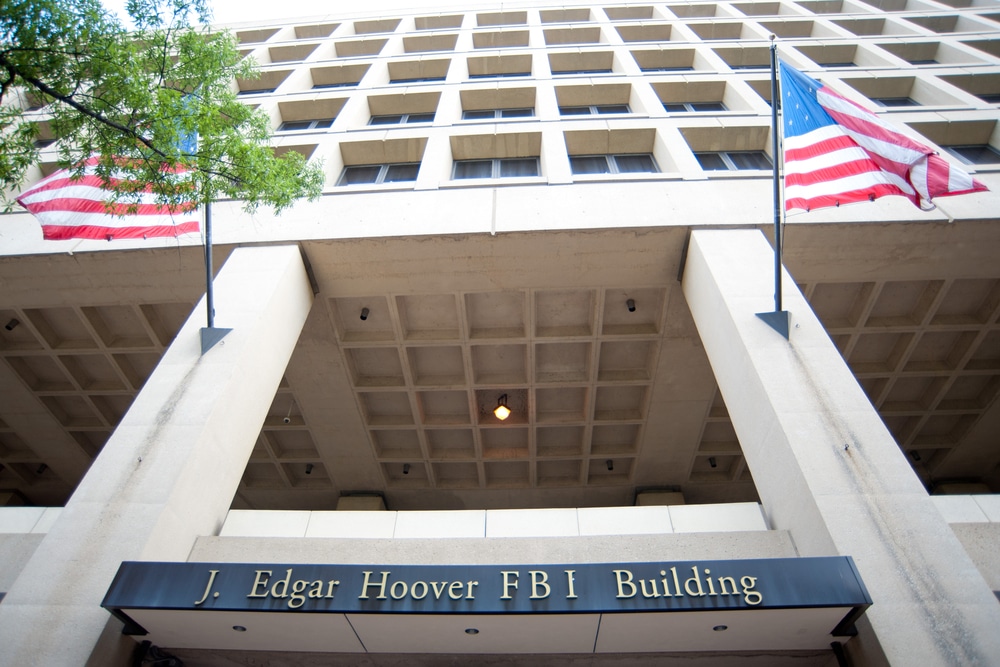“Today’s threat to our national security is not a matter of military weapons alone. We know of new methods of attack. The Trojan Horse. The Fifth Column that betrays a nation unprepared for treachery.”
Such were the remarks from President Franklin Delano Roosevelt’s fireside chat on May 26, 1940. Roosevelt’s sentiments captured and propagated a growing sense of fear and paranoia that the United States was entering a covert war with a hostile foreign power. These sentiments, coupled with the steps taken by the United States government to fight them, are strikingly similar to those of today. With Vladimir Putin as a stand-in for Hitler and MAGA for the alleged rising presence of domestic fascism, supporters of the foreign policy status quo are mobilizing a version of history to frame current dissent as beyond the pale and to justify their extraordinary steps to curtail it.
As they had during the Great War, the United States government and American interventionists preceded official entry into World War II with a concerted effort to convince Americans of the need to aid the Allies. This push to move foreign policy opinion accompanied a growing panic concerning domestic extremism, particularly on the Right, in what historian Leo Ribuffo called “the Brown Scare.”
The Federal Bureau of Investigation (FBI) was among the institutions that perpetuated the scare and constricted American foreign policy opinion. During the height of the “Great Debate” concerning American entry into the Second World War, the White House used the FBI as a means to surveil and gather political intelligence. The FBI’s authority to conduct these operations stemmed from a 1936 directive in which FDR formally granted the bureau the power to monitor “subversive activities,” primarily the presence of explicitly illiberal organizations like the German American Bund. The fear of domestic extremism, coupled with the domestic security demands of the Second World War, proved a boon to the FBI and the career of its director, J. Edgar Hoover. From 1933 through the end of World War II, the FBI’s budget grew 16-fold and its number of agents rose from 266 to around 5,000. With the outbreak of war in Europe, and the ensuing foreign policy debate in the United States, the FBI’s writ to monitor “subversive” organizations was extended to noninterventionist groups, chiefly, the America First Committee (AFC).
To achieve its mission to monitor the AFC and its leadership, principally Charles Lindbergh, the FBI employed its usual litany of odious and often extralegal collection techniques, including wiretaps, break-ins, and bugging. The entirety of the FBI’s surveillance campaign against the AFC was done without a criminal predicate, and was, therefore, illegal. In addition to the FBI’s assortment of black-bag techniques, the bureau also attended AFC meetings, gathered their materials, and collected public and often derogatory information on members and leadership. Among the information collected during the FBI’s campaign was some of the non-interventionist Senator Gerald Nye’s correspondence, collected incidentally during an illegal wiretap in the execution of another and eventually unfounded investigation. Knowledge gathered by the FBI, either fair or foul, revealed nothing legally actionable but did provide the Roosevelt administration and its allies in Congress with information it would not have otherwise obtained.
Throughout 1941, FBI headquarters and field offices received reports from private citizens in which they offered up gossip, commentary, and concerns about the America First Committee, its members, and its activities. Letters to J. Edgar Hoover and other government officials, located within the FBI files on the AFC, revealed that numerous Americans voluntarily participated in the FBI’s domestic surveillance and legitimately believed that non-interventionism presented an existential threat to the nation and advocated for authoritarian measures to address the presence of the alleged internal threat.
In a letter addressed to President Roosevelt, one such correspondent from Philadelphia, Pennsylvania wrote, “I therefore implore you, or have someone In Washington, try to break this rotten [America First Committee]” and added that “a Democracy should not permit traitors to go on and on and on causing more disunion.” Similarly-minded individuals who wrote to the FBI saw the AFC as an enemy within and opined on possible solutions to this “fifth column.” One concerned citizen floated the idea of sending AFC’s leadership “to concentration camps, or some place [sic] where they could do no more harm.” In a letter dated from June 10, 1941, a full seven months the attack on Pearl Harbor, another correspondent agreed with such sentiment. Its author complained that the FBI was unwilling to find all the “subversive individuals,” i.e., antiwar activists, and “round them all up.” Not content with mere extrajudicial imprisonment, still, another writer to the FBI lamented that America was too lenient with the America Firsters to do what other countries, “big or small,” do with their “traitors,” and put them “against the wall.”
While other correspondents with the FBI were considerably less authoritarian in their desires, they willfully offered up information to the bureau. These voluntary assets delivered the names and addresses of AFC members, forwarded AFC materials, circulated anti-AFC propaganda, and provided their assessments of individuals’ motivations and assumed links to Nazi Germany. These citizen spies made note of America Firsters’ views on FDR, his foreign policy, the location of new chapters, speculated on the presence of draft-dodgers within these chapters, and the ethnic makeup and presence of foreign accents at AFC events.
Correspondents also ratted out their neighbors and coworkers to the FBI, treating membership in the AFC akin to membership in a spy ring. One correspondent from Staten Island was appalled that AFC members showed disdain for FDR and his foreign policy. They noted that “a woman with a decided [sic] German accent” made the galling suggestion that FDR “should be impeached [underlined in original].” They went on to note that they were stunned into silence and dared not defend the honor of the president as they were “spotted” by “3 tough men.” Implicit within this correspondent’s letter, as with others, was the view that merely disagreeing with the president was worthy of suspicion.
The information citizens gave amounted to little more than gossip, generating more paperwork than leads. Despite the FBI’s failure, these acts of surveillance, including writing the FBI, matched with the official writ of the bureau and the often-glowing responses from government officials helped to sustain fear among the American populace. Correspondents, be they regular people or members of Congress, sought and received validation for their paranoia and thereby sustained a domestic panic that curtailed legitimate foreign policy debate; as historians Douglas M. Charles and John P. Rossi wrote, the FBI’s efforts, even if indirectly, “successfully defined the parameter of what was permissible in public debate and cautioned those who would oppose government policy.” Combined with those of the British government and (nominally) private actors, the FBI’s energies successfully collapsed the Overton Window. They created a useable (and mythic) history that has served the foreign policy consensus for decades.
Despite the FBI’s best efforts, their agents found no evidence of illegal activity or overseas connections, or unlawful funding activity within the America First Committee. From the perspective of the White House, the FBI’s efforts, at best, provided them with political information that gave it an edge in public debate. The FBI’s collection also served as a means of distributing information on AFC and other non-interventionists to friendly members of Congress. Despite failing to create a legal mechanism to silence the America Firsters, the FBI’s surveillance campaign succeeded in one area; it helped to sustain an environment of fear that successfully branded non-interventionism as a subversive activity worthy of opprobrium and suspicion.
The United States did not look over the brink into the chasm of domestic fascism in the waning days of American neutrality, and moral considerations of entering the war aside, the United States was never under military or covert threat from the Nazi regime. Nor did their avatars within the German American Bund, or its fellow travelers like the Silver Shirts—however odious their presence—constitute a threat to the American republic. However, the United States took its first giant steps into imperium overseas, and it implemented a form of soft authoritarianism within its borders that lasted long after the end of the Second World War.
The federal government repurposed the powers, personnel, and legal techniques granted to the FBI during World War II against left-wing targets. The postwar growth of the security state, coupled with the normalization of corporatism (banally referred to as “private-public partnerships”) and an aggressive overseas foreign policy, bear many of the characteristics of the dreaded F word. Yet an AFC member with controversial views of FDR did not implement these transformations to American society. These changes were wrought by the federal government, bolstered by the opinions of the redacted correspondents who longed to imprison or execute their political opponents, all in the name of fighting fascism.
Yet, the image of the AFC as an inherently subversive organization has resurfaced in recent years. Despite the dispositive findings of the FBI and decades of scholarship from credentialed academics, the Brown Scare has returned to (liberal) American consciousness. Recent academic work like Susan Dunn’s 1940, Bradley W. Hart’s Hitler’s American Friends, Sarah Churchwell’s Behold America as well as Rachel Maddow’s pop history podcast Ultra, and the novel and HBO miniseries The Plot Against America have all resurrected the Brown Scare and view American non-interventionism as a subversive activity, one either essentially embedded within, or suspiciously adjacent to American fascism.
With the postwar American order under strain overseas and losing legitimacy within the minds of a growing number of Americans, consensus tastemakers have remobilized the image of America, teetering on the edge of fascist tyranny in the late 1930s to buttress policy objectives in a post-2016 world. In doing so, they not only repackage a long-debunked version of the past, but they obscure the civil rights abuses of yesteryear to legitimatize government efforts to censor speech or undermine associations deemed threatening to the regime in the present. As in the past, supporters of current American foreign policy, either earnestly or cynically, compare their domestic opponents to agents of outside hostile actors. Meanwhile, the federal government, yet again, has inserted itself into the domestic foreign policy debate, monitored antiwar activists, and allegedly suppressed online speech on behalf of a foreign power.
History is repeating, just not in the manner portrayed in the pages of The New York Times or on the programming of MSNBC.








